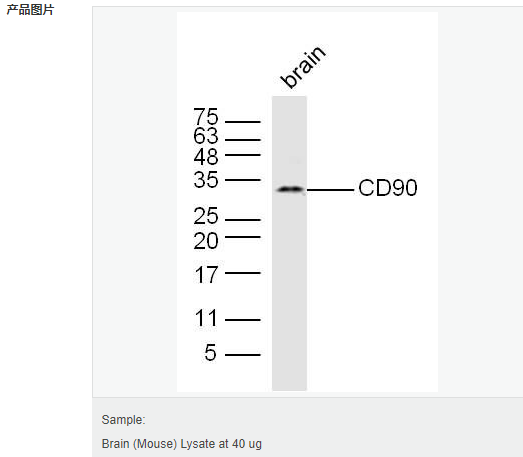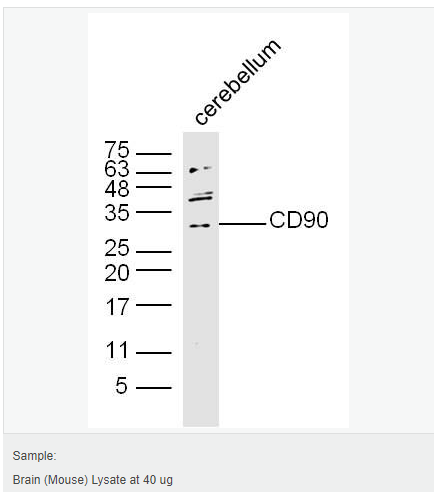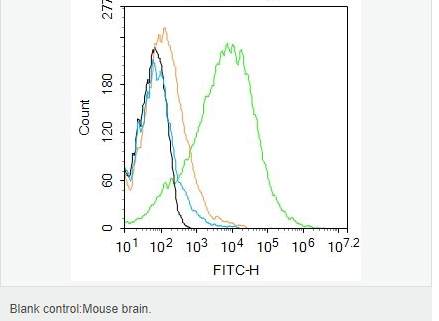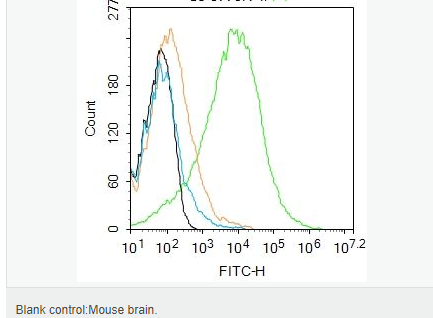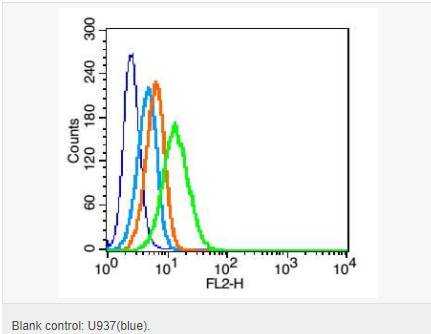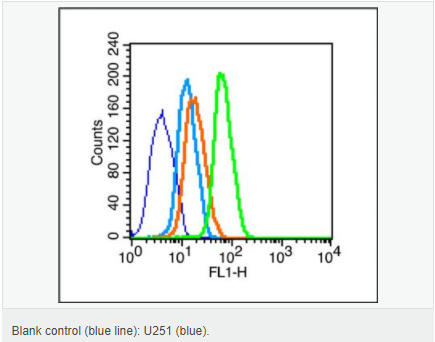

貨號(hào)
產(chǎn)品規(guī)格
售價(jià)
備注
BN41589R-50ul
50ul
¥1486.00
交叉反應(yīng):Human,Mouse,Rat(predicted:Dog,Pig,Horse,Sheep) 推薦應(yīng)用:WB,IHC-P,IHC-F,IF,Flow-Cyt
BN41589R-100ul
100ul
¥2360.00
交叉反應(yīng):Human,Mouse,Rat(predicted:Dog,Pig,Horse,Sheep) 推薦應(yīng)用:WB,IHC-P,IHC-F,IF,Flow-Cyt
BN41589R-200ul
200ul
¥3490.00
交叉反應(yīng):Human,Mouse,Rat(predicted:Dog,Pig,Horse,Sheep) 推薦應(yīng)用:WB,IHC-P,IHC-F,IF,Flow-Cyt
產(chǎn)品描述
| 英文名稱(chēng) | CD90/Thy-1 |
| 中文名稱(chēng) | CD90抗體 |
| 別 名 | CD90 / Thy1; CD7; CD90 antigen; CDw90; FLJ33325; MGC128895; T25; Theta antigen; Thy-1; Thy 1; Thy 1 cell surface antigen; Thy 1 membrane glycoprotein; Thy 1 membrane glycoprotein precursor; Thy 1.2; Thy-1 T-cell antigen; Thy1 antigen; Thy1 T cell antigen; Thy1.1; Thy1.2; Thymus cell antigen 1, theta; THY1_RAT; THY1_HUMAN. |
| 研究領(lǐng)域 | 細(xì)胞生物 免疫學(xué) 神經(jīng)生物學(xué) |
| 抗體來(lái)源 | Rabbit |
| 克隆類(lèi)型 | Polyclonal |
| 交叉反應(yīng) | Human, Mouse, Rat, (predicted: Dog, Pig, Horse, Sheep, ) |
| 產(chǎn)品應(yīng)用 | WB=1:500-2000 IHC-P=1:100-500 IHC-F=1:100-500 Flow-Cyt=1μg/Test IF=1:100-500 (石蠟切片需做抗原修復(fù)) not yet tested in other applications. optimal dilutions/concentrations should be determined by the end user. |
| 分 子 量 | 12kDa |
| 細(xì)胞定位 | 細(xì)胞膜 |
| 性 狀 | Liquid |
| 濃 度 | 1mg/ml |
| 免 疫 原 | KLH conjugated synthetic peptide derived from rat Thy-1:31-120/161 <Extracellular> |
| 亞 型 | IgG |
| 純化方法 | affinity purified by Protein A |
| 儲(chǔ) 存 液 | 0.01M TBS(pH7.4) with 1% BSA, 0.03% Proclin300 and 50% Glycerol. |
| 保存條件 | Shipped at 4℃. Store at -20 °C for one year. Avoid repeated freeze/thaw cycles. |
| PubMed | PubMed |
| 產(chǎn)品介紹 | Thy-1 or CD90 (Cluster of Differentiation 90) is a 25–37 kDa heavily N-glycosylated, glycophosphatidylinositol (GPI) anchored conserved cell surface protein with a single V-like immunoglobulin domain, originally discovered as a thymocyte antigen. Thy-1can be used as a marker for a variety of stem cells and for the axonal processes of mature neurons. Structural study of Thy-1 lead to the foundation of the Immunoglobulin superfamily, of which it is the smallest member, and led to some of the initial biochemical description and characterization of a vertebrate GPI anchor and also the first demonstration of tissue specific differential glycosylation. Function: May play a role in cell-cell or cell-ligand interactions during synaptogenesis and other events in the brain. Subcellular Location: Cell membrane; Lipid-anchor, GPI-anchor. Tissue Specificity: Abundant in lymphoid tissues. Post-translational modifications: Glycosylation is tissue specific. Sialylation of N-glycans at Asn-93 in brain and at Asn-42, Asn-93 and Asn-117 in thymus. Similarity: Contains 1 Ig-like V-type (immunoglobulin-like) domain. SWISS: P01830 Gene ID: 24832 Database links: Entrez Gene: 7070 Human Entrez Gene: 21838 Mouse Omim: 188230 Human SwissProt: P04216 Human SwissProt: P01831 Mouse Unigene: 644697 Human Unigene: 3951 Mouse Unigene: 108198 Rat Important Note: This product as supplied is intended for research use only, not for use in human, therapeutic or diagnostic applications |
